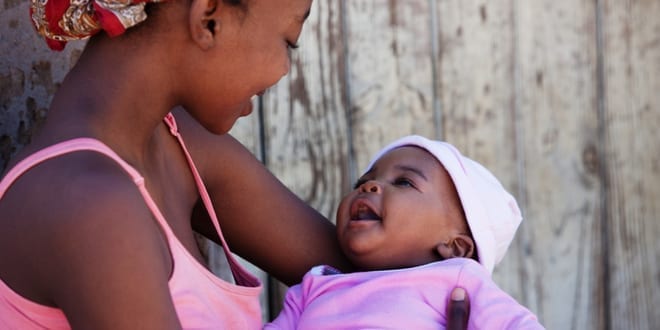A team of investigators from six universities across the US reports that an intervention designed to reduce poverty had a direct impact on children’s brain development. After one year of monthly cash support, infants in low-income families were more likely to show brain activity patterns that have been associated with the development of thinking and learning.
The paper was just published online by the journal Proceedings of the [US] National Academy of Sciences (PLoS) under the title “The impact of a poverty reduction intervention on infant brain activity.” Collaborating institutions include Teachers College of Columbia University in New York; the University of Wisconsin at Madison; the University of California at Irvine; Duke University’s Sanford School of Public Policy in Durham, Noth Carolina; New York University; and the University of Maryland.
This study measured brain activity among a sample of 435 one-year-old children who were participating in a landmark randomized controlled trial known as “Baby’s First Years.” The larger trial, the first direct poverty reduction evaluation in the United States to focus on early childhood, recruited 1,000 mothers with low incomes from postpartum wards in a dozen hospitals in four U.S. metropolitan areas: New Orleans, New York City, Omaha, and Minneapolis/St. Paul.
Shortly after they gave birth, participating mothers were randomized to receive either a large monthly cash gift of $333/month or a nominal monthly cash gift of $20/month. The gifts were disbursed on debit cards, and the mothers, most of whom were black or Latina, were free to spend the cash gifts in whatever way they chose, with no strings attached. The new study reports the initial findings on infant brain activity after the first 12 months of the poverty reduction intervention. The mothers will continue to receive the cash gifts, funded by charitable foundations, until their children are four years and four months old.
“We have known for many years that growing up in poverty puts children at risk for lower school achievement, reduced earnings, and poorer health,” said the senior author on the study, neuroscience and education Prof. Kimberly Noble, at Teachers College. Poverty has also been associated with differences in children’s brain development. “However,” notes Noble, “until now, we haven’t been able to say whether poverty itself causes differences in child development, or whether growing up in poverty is simply associated with other factors that cause those differences.”
Asked to comment whether this research was relevant to Israel, Prof. John Gal of the Hebrew University of Jerusalem’s Paul Baerwald School of Social Work and Social Welfare and chairman of Welfare Policy Program at the Taub Center for Social Policy Studies in Jerusalem said: “This fits very well with policy options that the Taub early childhood team has raised in its publications and based on the studies that we have undertaken. Among others, we have suggested changing the structure of the child benefit program so that families with infants receive higher child benefits than those with children of older ages. We have also noted the existing income support program, which provides a social safety net, does not offer adequate protection against poverty for families with children and must be raised to enable families with young children to escape dire poverty.”
Noble noted that children’s brains naturally adapt to their experiences. “All healthy brains are shaped by their environments and experiences, and we are not saying that one group has ‘better’ brains. But, because of the randomized design, we know that the $333 per month must have changed children’s experiences or environments, and that their brains adapted to those changed circumstances.”
The authors said they don’t yet know whether these differences will persist over time or whether they will lead to differences in children’s cognitive or behavioral development, which will be measured in future waves of the study. Work is underway to examine potential mechanisms, including how mothers spent the money, and how having more money may have changed parenting behaviors, family relationships and family stress.
The shortcode is missing a valid Donation Form ID attribute.



